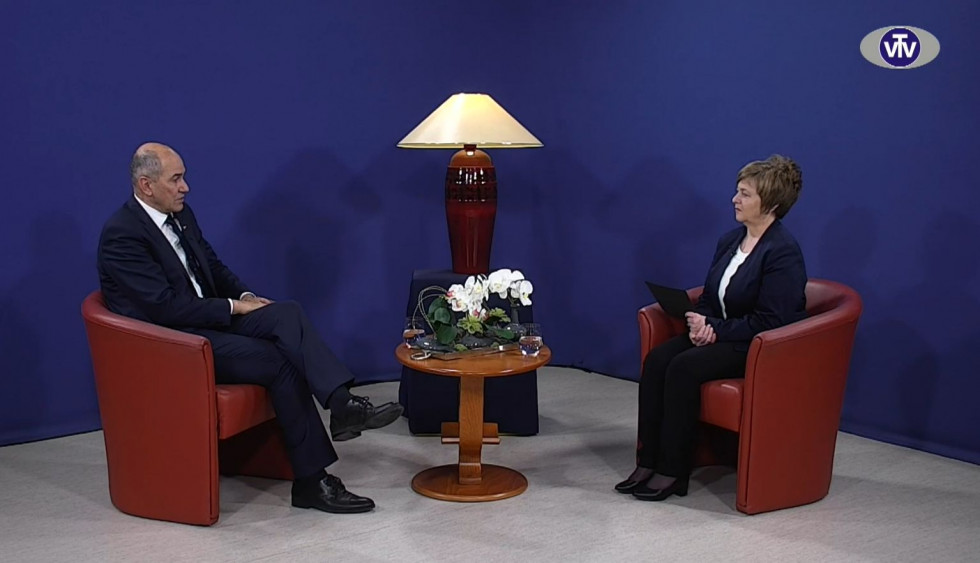Prime Minister Janez Janša on Dober večer g. predsednik
- Former Prime Minister Janez Janša (2020 - 2022)

Prime Minister Janez Janša on Dober večer g. predsednik | Author Kabinet predsednika vlade
The Prime Minister also spoke about the Slovenian Presidency of the Council of the EU, pointing out the number of closed dossiers as the greatest success of the presidency, which was also recognised by others, while harmonising the attitude of the 27 Member States towards the crisis in Afghanistan was the most important achievement in terms of the difficulty of the challenge. He recalled that Europe was threatened by the same wave of migrants as after the war in Syria, and that a decision was taken that Europe would only help those who were in immediate danger, could get refugee status and had helped us. "However, we will not open the doors of the European Union to millions of Afghans who are only seeking a better European future."
Regarding the COVID-19 pandemic, the Prime Minister said that, according to experts' warnings, it is not over yet, as the virus is mutating and the vaccination coverage varies in different parts of the world. "The key dilemma is to what extent vaccination and, in the case of recovery from COVID-19, immunity have increased our resistance to future variants." He expressed the hope that science will advance and develop a vaccine that will make this virus harmless or immunise us, or that medicine development will advance to the point where a cure will prevent anyone from becoming sick or dying from this infection. He added that in Slovenia, by far the highest number of deaths in the first waves of the epidemic occurred in homes for the elderly, where the accommodation capacity did not allow for the creation of isolation zones due to lack of space. "When the most vulnerable residents of homes for the elderly were vaccinated, the number of deaths due to the coronavirus decreased dramatically." According to the Prime Minister, it is sad that no new homes for the elderly have been built in the last 15 years, while a lot of money has been spent on various analyses.
The Prime Minister also touched on the increase in energy and raw material prices. "Due to considerable speculation about the sale of petroleum products, we will regulate their prices to prevent such speculation." He added that Slovenia has national reserves, which can be used to prevent petroleum products from running out.
On the Russian aggression in Ukraine, the Prime Minister said that what was happening was something that the Western world believed could not happen again in the 21st century. "It is frightening that we know that they are lying, but they are still lying because they think they can, since they have closed down the public space in the Russian Federation and the Russian people do not know what is happening." The Prime Minister added that we are not living in a Cold War era when propaganda could obscure the real facts. "We just want the Russians to put someone in charge who will not endanger others and will also ensure the well-being of the Russian people." He continued by saying how sad it was for a nation that has given European civilisation a wealth of artists and enriched its culture to threaten, after decades of single-mindedness, not only its neighbourhood but also European and world peace. In his talk, the Prime Minister also addressed the refugee crisis. "I would like to express my profound gratitude to all Slovenians who have shown their solidarity with the Ukrainian people."
The discussion also touched on the situation in Slovenia. The Prime Minister spoke about how the Government is looking after the most vulnerable groups of the population, highlighting the adoption of the Personal Income Tax Act. "All net wages will increase based on the amended Personal Income Tax Act. We are also working to make more highly skilled jobs available, where more money can be earned, and in a way that will not put any additional strain on the economy." On economic growth, the Prime Minister said that income has increased by more than 8% in real terms. "We have created a real basis for higher pensions, higher wages and greater prosperity." The Prime Minister concluded by saying that the challenges lying ahead are manageable. "Even in difficult times, Slovenia has proven that we can do more."

